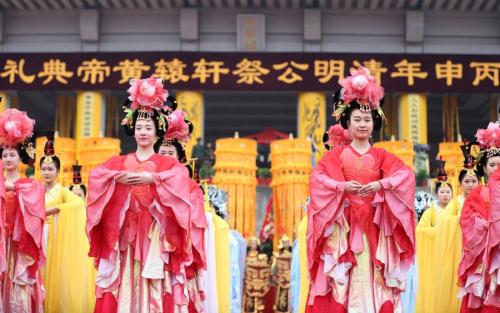周一上午,1万多人齐聚黄帝陵墓,向华夏文化祖先传奇人物黄帝致敬。

Actressesperform at a ceremony at the mausoleum to Huangdi (the Yellow Emperor) in Huangling, Shaanxi province, to pay their respects to the legendary figure regarded as the initiator of Chinese civilization,April 4, 2016.
More than 10,000 people gathered in front of the mausoleum to Huangdi, the Yellow Emperor, on Monday morning to pay their respects to the legendary figure regarded as the initiator of Chinese civilization.
At 9:50 am, the rituals got underway, with yellow flags and a 56-meter-long dragon fluttering in the breeze outside the stately tomb on Qianshan Mountain in Huangling, Shaanxi province.
Drums were pounded and bells rang out in the light morning drizzle as the ceremony was broadcast live. It was sponsored by the Taiwan Affairs Office of the State Council, the State Council's Overseas Chinese Affairs Office and the Shaanxi provincial government.
Hu Heping, the acting governor of Shaanxi, read an address in ancient Chinese prose.
"Today, Tomb Sweeping Day, sons and daughters of the Chinese nation hold a memorial ceremony for our ancestor the Yellow Emperor, who began Chinese civilization," he said. "Our civilization has a long history, and the nation's revival needs our hard work."
A 30-year-old man from Taichung, was one of more than 200 people from Taiwan who attended the ceremony. He said paying tribute to the Yellow Emperor is one of the best ways to inherit Chinese culture and traditions.
"It reminds us of where we start and the brotherhood we share across the Straits," he said.
The ceremony was held to coincide with Tomb Sweeping Day, or Qingming Festival, when Chinese honor their ancestors by burning incense and placing flowers on tombs.
The rituals on Qianshan Mountain included 550 actors and college students performing a dance of worship.
The Yellow Emperor is said to have been born in Xinzheng, in what is now Henan province, about 5,000 years ago.
He has been credited with many accomplishments, such as introducing legal and governance systems, establishing Chinese civilization and defeating his rival, the Yan Emperor.
Modern-day Chinese sometimes refer to themselves as descendants of the Yan and Yellow emperors.